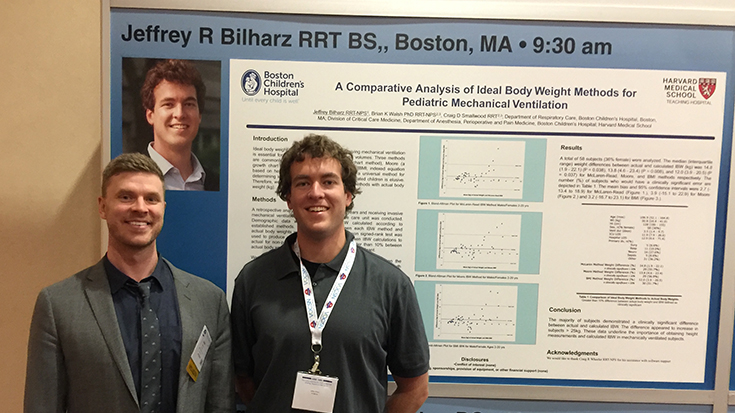
The best reason for conducting any study is a dearth of other studies on that topic. When Jeffrey Bilharz, BS, RRT, RRT-NPS, went looking for previous research related to ideal body weight methods for pediatric mechanical ventilation very little turned up, and that led to his Editors’ Choice-winning abstract at last year’s Open Forum in Indianapolis. The respiratory therapist from Boston Children’s Hospital shares his interest in the area, and in research in general, with us here.
Why did you decide to conduct the study, “A Comparative Analysis of Ideal Body Weight Methods for Pediatric Mechanical Ventilation”? What piqued your interest in this topic?
At the most basic level, or the way I think of it at least, our job is to “put stuff in” and then “get stuff out” of the lungs. For mechanically ventilated subjects, a large percentage of the “put stuff in” discussions between respiratory therapists and members of the medical team relates to tidal volume applications. That being said, estimating an accurate total lung capacity becomes useful for utilizing ventilator strategies. Since I work in a pediatric facility, my interest piqued when a search for pediatric ideal body weight methods subsequently led to the discovery of a lack of information and data within this focus.
Was this your first time conducting a research study? If not how many other studies have you conducted and where have you presented them or had them published?
This was the first time conducting a research project of this nature and magnitude. I received dual bachelors’ degrees in chemistry and environmental studies before becoming a respiratory therapist, so I was already familiar with scientific methods and basic lab reports. I was a research assistant for the environmental science department at Hobart and William Smith Colleges and presented some projects to grassroots groups and over the radio. However, none of that was at the level of publication.
What did you do to gain support from your organization to conduct this study?
I didn’t have to do anything to gain their support because they were already so willing to help me succeed. My department places a heavy emphasis on education and employee-driven projects. I can’t thank them enough for the time they took pushing me forward.
What were the biggest challenges you faced as you carried out the study and how did you overcome them?
My biggest challenge during this time was constructing the manuscript. Completing the abstract was one thing, but formulating a publication was something I’ve never had to do before. Between the countless hours I spent reading articles and the amazing mentors who helped me along the way, I found the whole process to be an invaluable learning experience.
How difficult was it to work the study into your normal job responsibilities and how did you alter your work routine to make it happen? Do you think it was worth the time and effort?
While it’s definitely possible to schedule time during my shift for this type of a project, I preferred doing the majority of the work from inside the quiet of my own home. It was easily worth the extra time and effort.
How did it feel to learn that your abstract had been accepted to the Open Forum — and most especially, that it was selected for the Editors’ Choice session?
I was ecstatic to hear that my abstract was accepted. I was also unbelievably honored to learn of the Editors’ Choice selection. I had only been working in the field for two years at the time, so for something like that to happen this early in my career was really exciting.
How do you think conducting a study like this and having it accepted to the Open Forum is helping to further your career in respiratory care?
This was an incredible opportunity for me because I got to take a step away from the usual responsibilities of being a bedside respiratory therapist and jump into a totally different sector within our field. Being a part of the Open Forum opened my eyes to the amount of research that’s being undertaken by respiratory therapists all over the country.
What advice do you have for other therapists who might like to follow in your footsteps but just don’t know how to get started?
Find a great mentor who genuinely wants to help. If you don’t have anyone in mind, throw yourself out on a limb and talk to clinicians you’ve never met before until you find someone who will listen. I never submitted this abstract with the intent of earning an Editors’ Choice award. I did it because I really like research and just wanted to get involved.
Are you planning to conduct more studies in the future? If so, what will you study next and why?
I want to expand upon this current study on a greater scale. Ideal body weight as it relates to pediatric mechanical ventilation is truly a nascent field of study. There’s not a lot of data out there so it would be nice to investigate this topic further.
Email newsroom@aarc.org with questions or comments, we’d love to hear from you.















